
Related
Guests
- Ismail Mehranesthesiologist and chair of IMANA Medical Relief.
- Azeem Elahipulmonary and critical care physician.
Links
Nearly seven months of constant bombardment, siege and obstruction of aid deliveries have annihilated the healthcare system in Gaza. Last week, the Palestinian Health Ministry said that around 600,000 Palestinians in the northern Gaza Strip no longer have access to any kind of healthcare. The World Health Organization has said that Israel is “systematically dismantling” the health system in Gaza. Only 11 hospitals out of 36 hospitals in Gaza are partially functioning. At both of Gaza’s largest hospitals, Al-Shifa and Nasser, Palestinians found hundreds of bodies buried in mass graves after Israel raided and destroyed the facilities. Democracy Now! speaks with Dr. Ismail Mehr and Dr. Azeem Elahi just after they volunteered at the largest hospital still operating in Gaza, the European Hospital in Khan Younis. “The healthcare system has been always in a noose, and that noose tightens at times when there’s conflict,” says Mehr. “Right now that noose has completely just hung the healthcare system.”
Transcript
AMY GOODMAN: This is Democracy Now!, democracynow.org, The War and Peace Report. I’m Amy Goodman.
Nearly seven months of constant bombardment, siege and obstruction of aid deliveries have annihilated the healthcare system in Gaza. Last week, the Palestinian Health Ministry said around 600,000 Palestinians in the northern Gaza Strip no longer have access to any kind of healthcare. The World Health Organization has said that Israel is, quote, “systematically dismantling” the health system in Gaza. Save the Children has reported Israel’s attacks on the healthcare sector in Gaza, at the rate of 73 attacks per month, are higher than in any other recent conflict in the world.
Only 11 hospitals out of 36 hospitals in Gaza are partially functioning. In April, Gaza’s largest hospital, Al-Shifa in Gaza City in the north, was completely destroyed following a two-week siege by Israeli forces. Then, Gaza’s second-largest hospital, Nasser Hospital, was also destroyed following another brutal siege by Israeli forces in Khan Younis. After their withdrawals, Palestinians found hundreds of bodies buried in mass graves at both hospitals.
Now the largest hospital remaining partially operating in Gaza is the European Hospital in Khan Younis. Like so many other hospitals, it’s also sheltering thousands of displaced Palestinians.
We’re joined now by two doctors just back from Gaza who volunteered at the European Hospital. Dr. Ismail Mehr is an anesthesiologist and chair of the nonprofit IMANA Medical Relief, which focuses on disaster relief. Dr. Mehr has participated in over 35 medical missions globally, has been to Gaza five times dating back to the 2008-2009 war. He’s joining us from Hornell, New York. And joining us from Charlotte, North Carolina, is Dr. Azeem Elahi, a pulmonary and critical care physician who was part of the team of doctors volunteering at European Hospital with Medical Relief. Dr. Elahi has participated in several humanitarian medical mission trips to various parts of the world, was previously in Gaza in 2019.
We welcome you both to Democracy Now! Dr. Mehr, let’s begin with you. Describe what you saw.
DR. ISMAIL MEHR: First of all, thank you, Amy, for having both of us.
And describe what I saw, a very common question. Immediately when we entered and in the mornings went to go to work, the first sight was all the amputees, the children, from children through the adults. Seeing the number of amputees, double amputees, with 30,000 people living outside or inside that hospital, was our first sights, the first thing that we saw. And, you know, my experience in Gaza — this was my fifth time there — I had never seen something like this, including my visits to Syria, Somalia, Sudan and Yemen in the past, you know, conflict zones, areas under tense circumstances. I have never seen this number of amputees, destruction, and people just seeking refuge. It was an experience like no other.
AMY GOODMAN: If you can tell us about a few cases and also talk about patients coming from other hospitals and what you heard about Nasser and Shifa, this horrifying report we got in the last week of mass graves discovered at both major hospitals?
DR. ISMAIL MEHR: Yeah, you know, you make a lot of friends as you travel back and forth to Gaza, I mean, people that I was deathly sick and worried about if they were still alive. And when I was at European Gaza Hospital, I ran into some of my friends. I saw them there. They had shifted down from the north. And they shared some of the horrors of Shifa Hospital. They shared that they were there when forces came in, and some of the stories and what took place. And they shared with me the, you know, people that were friends of ours that had passed away, like Dr. Mehdat, the plastic surgeon who was killed. And Dr. Ahmed, a young plastic surgeon, and his mother were killed at Shifa, and their bodies were found there. They shared those stories with us. And we paused, and we grieved, and then we got back to work.
Patients, you know, Yassin, 11-year-old boy, was a double amputee. He’s 11 years old. You know, I have children. Those watching have children, grandchildren, nieces and nephews. Imagine your 11-year-old family member losing both his legs. And now in Gaza there were only two prosthetic centers that would help these amputees throughout the Gaza Strip, and those no longer exist.
And as you mentioned earlier a systematic dismantling of healthcare, you know, we saw it. We incurred it. Every night we would hear the bombings, the strikes, the drones, the artillery. And like clockwork, myself and Dr. Azeem and my other two colleagues, Dr. Shazia and Dr. Shariq, would know it’s time for us to get to the emergency department. And we would work long hours, into the early-morning hours, helping the local doctors at European Gaza Hospital try to save lives as mass casualties would come in. Some would be dead on arrival, and then some would die while we were working on them, and then others we’d be able to save. And, you know, as we started the show earlier about the recent bombing strike in Rafah, it brought back vivid memories, like, and I could recall myself and Azeem in that emergency department going through what takes place.
And to follow up, yes, European Gaza Hospital is the only tertiary, only high-level hospital remaining. It is not a massively huge hospital like Shifa was or Nasser was. And now when strikes take place in other places, there is no place that can stabilize or take care of such mass casualties besides European Gaza Hospital. So, from Rafah, they’re brought to European Gaza Hospital, which is probably about five to eight kilometers probably, and then receive care. So, you know, this is life in Gaza as a healthcare worker right now trying to deal with all this.
AMY GOODMAN: This is a short video your team filmed of some of the children and people taking shelter inside European Hospital. Many of them have set up makeshift tents in the hallways.
DOCTOR: Another day in EGH, Islamic — how are you?
PALESTINIAN CHILD 1: How are you?
PALESTINIAN CHILD 2: How are you?
DOCTOR: Hey!
PALESTINIAN CHILD 3: How are you?
PALESTINIAN CHILD 4: How are you?
DOCTOR: These are people, they’re living in the hospitals.
PALESTINIAN CHILD 5: How are you?
DOCTOR: Probably another 20,000 at least outside. Hey. How are you? So, they’ve lost everything.
PALESTINIAN CHILD 6: How are you?
DOCTOR: They live in the hospitals. They’re not patients. They make makeshifts on the side. There’s people up on the stairs like this. This is life in Gaza.
AMY GOODMAN: That’s inside European Hospital. Dr. Azeem Elahi, if you can describe the atmosphere, not only the patients, but the people taking refuge, and then what people are dying of? You’ve got the airstrikes directly, but then you also have disease, and you have this imminent famine. Talk about that, Dr. Elahi.
DR. AZEEM ELAHI: Amy, thank you for inviting us to share our experience.
I was listening to that clip in my ears, and immediately a smile came on my face, just because it took me back to those moments when we’d walk through the hallways. It’s as equally happy as it is sad, because these are displaced people who have arrived to the hospital for shelter, for electricity, for food, with broken families. When you sit down and actually interact with the people that you encounter in these corridors, you realize very quickly that the families are extended families, and they’ve been brought together because of injured family members or family members who have passed away as a result of the war.
The corridors are lined, just like you see in that video. In every nook and cranny, every staircase, every space in the hospital where you’re taking care of patients, where the radiologist is reviewing scans, is occupied by displaced persons. The situation there is dire, because it does, in fact, interrupt medical care when you have this cohabitation of sterility and medical treatment with just life. And it’s a truly amazing parity to see in real life, because you can hear in the video the amazement and the joy and the laughter that you can hear from the children’s voices, but when they are tucked in behind those curtains, I can assure you that their life is very different than what their faces show.
AMY GOODMAN: And the issue of disease and people weakened by hunger, in addition to the direct — the morbidity from direct strikes?
DR. AZEEM ELAHI: The type of patients we would admit to the intensive care unit were oftentimes blast injury patients. I’m an adult critical care physician. And when I joined the European Gaza Hospital ICU, I realized the majority of our patients were actually pediatric patients. More than 50% of the patients in that ICU were under the age of 16, mainly because they were involved — when these bombings and the bombardment occurs, they’re typically in the evening, when the family units are sleeping together, and the patients that would make it to the hospital are the lucky ones. And just as Dr. Mehr pointed out, many of them would arrive dead, and the few that were able to survive would end up in the ICU.
The injuries we would see were trauma-related. So they had brain injuries, subarachnoid hemorrhages, subdural hemorrhages, traumatic brain injuries. They required mechanical ventilation because they weren’t able to breathe on their own. A lot of infections, especially in the postoperative setting, when your nutrition is affected — and this is true in the U.S., in the U.K., as it is anywhere else in the world. Every surgeon wants their patient to be as nourished as possible. We know, with clear-cut data, that patients who are malnourished are at higher risk of developing postoperative infections, postoperative morbidity.
AMY GOODMAN: I want to put the same question to Dr. Ismail Mehr, the question of the injuries people are suffering either from direct airstrike or from disease.
DR. ISMAIL MEHR: Yeah, I mean, Azeem was just a remarkable member of our team as was, like he shared, in the ICU. My role was, you know, I was in the operating room as an anesthesiologist. But with our experience and our team’s experience, we manned the ER quite often.
And what I want to really share with the viewers and the world, and my message is, is it’s very sexy to look at the bombings, the strikes, you know, and I share that — I’m being sarcastic, but, you know, that’s — the world focuses on traumatic stuff. What we forget is a grandmother who died from urinary tract infection. I had to do CPR on her and code her in the emergency department and then look at her son and say she died. He was like, “She just had an infection.” Because, as you shared earlier — excuse me — there is no healthcare system intact any longer. EGH is bursting at the seams — it’s not bursting, it has bursted.
And as you and I, when we get sick, or your child or grandchild or niece or nephew or aunt or uncle, you take them to the doctor. Gaza had a healthcare system in place, not always the most robust due to the embargo, but you could still go and see your doctor, get your glucose medicine. There was a gentleman, a mid-aged gentleman, that we had to do an amputation on because he had been barefoot for months, got an infection, learned that he never — he did not take his Glucophage or metformin. Those of you who are diabetics know those medicines. They’re for managing sugar. He got gas gangrene of his foot, came in so late that we thought he was going to die that night, operated on him early in the morning. He died six hours later.
What about the 20-year-old patient — I believe her name was Amna — who had fulminant liver failure from hepatitis A, not even — you know, hepatitis B and C are very severe forms of hepatitis. Hepatitis A is from unhygienic water and food. And she was dying in front of us in that emergency room. The mother who developed a blood clot in her leg because she’s been immobile living in a tent, and then she had a pulmonary embolism or a clot to her lung.
Every day there were people we were declaring dead in that emergency room who were dying of simple, basic things that in Gaza could be treated. I have seen them treated in Gaza before in my experience. And there’s no voice for those people. Yes, people are dying from the strikes every day, but the world is failing to see the implications of those who are the unaccounted for.
AMY GOODMAN: I want to ask you both to stay with us, because we have other questions about how this compares to other medical trips you have made as you volunteer in conflict zones around the world. And on Monday, we will discuss the Abu Ghraib decision. So, we have to break one more time. Dr. Ismail Mehr and Dr. Azeem Elahi, stay with us. They’re just back from volunteering at Gaza’s European Hospital with the IMANA Medical Relief team. Back in 20 seconds.
[break]
AMY GOODMAN: “Mum Sing to the Wind” by Nai Barghouti. This is Democracy Now!, democracynow.org. I’m Amy Goodman, as we continue with the two doctors just back from Gaza volunteering at European Hospital: Dr. Ismail Mehr, anesthesiologist, chair of the nonprofit IMANA Medical Relief, which focuses on disaster relief — Dr. Mehr has participated in over 35 medical missions globally, has been to Gaza five times dating back to 2008 and '09 — and Dr. Azeem Elahi is with us from Charlotte, North Carolina, pulmonary critical care physician who is just back also from European Hospital. Dr. Mehr, you've been in dozens of conflict zones around the world. How does Gaza compare?
DR. ISMAIL MEHR: There is no comparison. You know, you say you’ve seen — you know, in a long career, that when you’ve seen everything, you know your career is complete. And I thought at one point that I’ve seen everything, and when I walked into Gaza, I’m not even close. I can compare it to Gaza 2008, 2009, to 2022, 2023. You know, I had the opportunity to go Deir al-Balah. It’s a little bit north of Khan Younis, and I had to drive through Khan Younis to deliver supplies and medications that we had for different hospitals. And as far as I could see, it looked like Armageddon. There was not a single building, single structure, single gas station, single hospital, single school, single university that remained standing. And then, the despair that you see around you at European Gaza Hospital, I can’t do justice to describe it. I just — maybe Azeem can or someone else can. I just — it’s — you can’t describe it.
AMY GOODMAN: I want to go to one of the people you met at European Hospital, as you were just describing, Rafat Badwan, describing what he and his relatives were sleeping, targeted by an Israeli strike. His son survived, but severely injured.
RAFAT BADWAN: My brother and his wife and his all children, two daughters and one son, are killed. Es Tesh’hedu, Inshallah. Also, my sister’s son are killed by them. We don’t do anything. Hasbunallahu wa ni’mal wakeel. Our Gaza and all the health sector need your support. There’s many injured and a shortage in medical supplies. We all need your help.
AMY GOODMAN: That’s Rafat Badwan, Dr. Mehr. If you can also talk about how Gaza has changed in the many times that you have been there back to 2008, ’09?
DR. ISMAIL MEHR: Yeah, I think people fail to — forget — everyone thinks everything started October 7th. This has gone back to — you know, 78, 75, 76 years ago, since 1948, and then, Gaza specifically, down back to the early 2000s with the embargo.
The healthcare system has been always in a noose, and that noose tightens at times when there’s conflict, or it loosens up, but it remains around the neck of the healthcare system. And right now that noose has completely just — you know, has hung the healthcare system.
I mean, people say “partially.” People use words as it’s “semi-functional” or “remaining hospitals.” Yes, there’s structures, and there’s amazing colleagues and brothers and sisters from healthcare that are doing amazing job, but a functional healthcare system to save lives has been extinguished. You know, I can’t describe what the situation is there.
And that gentleman, Mr. Badwan, he’s a pharmacist. And I remember that night vividly, and I’m sure Azeem does, as well. It was multiple casualties came in — children with depressed skull fractures, mothers. You know, some of them were his family members. Others were just others and his neighbors. And luckily, our team was there from IMANA and HEAL Palestine. You know, we partnered with HEAL Palestine in this mission. And we were able to work along and help save some lives that night. But what hurts me is, is that every day this is happening, and every day there are innocent people losing their lives.
AMY GOODMAN: Dr. Elahi, I wanted to get your final comment and your message as you come back to your practice in Charlotte, North Carolina, how this has changed you and what you’ll be telling the medical community here.
DR. AZEEM ELAHI: I would say, from 2019’s experience and our current experience just now, what you’ll realize from the people in Gaza is they just want the world to know and understand what they’re going through. You heard it in this gentleman’s voice, that he’s just expressing a plea to the world to provide help to the people of Gaza, see what’s happening there. And when I come back to the comfort of my home and the comfort of my family and the comfort of a modern healthcare system, it is —
AMY GOODMAN: Ten seconds.
DR. AZEEM ELAHI: — really difficult to understand what’s happening. I think we just have to open our eyes, share with the world what’s happening there, and open our hearts for them.
AMY GOODMAN: Dr. Azeem Elahi and Dr. Ismail Mehr, back from volunteering at Gaza’s European Hospital with the IMANA Medical Relief team.
That does it for our show. A happy early birthday to Denis Moynihan! Democracy Now! is produced with a remarkable team. I thank them all. I’m Amy Goodman. Thanks so much for joining us.

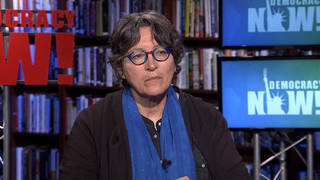
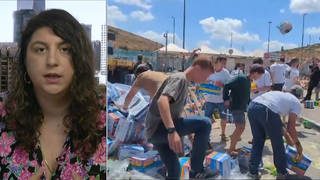
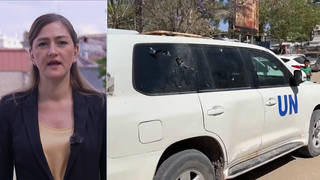
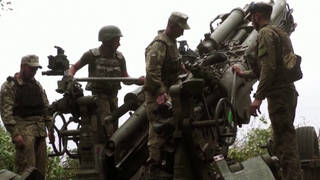
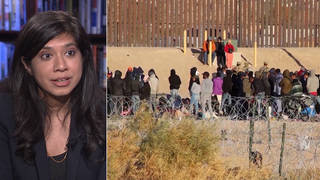




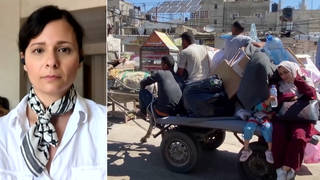
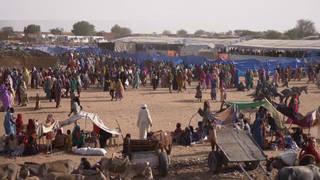
Media Options